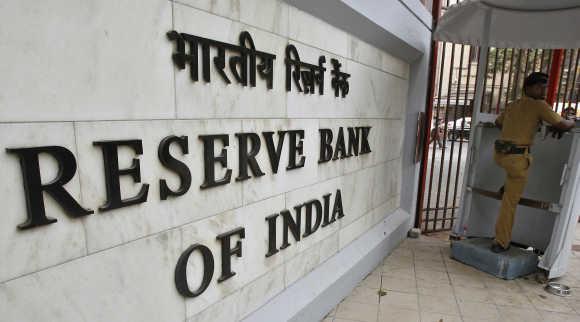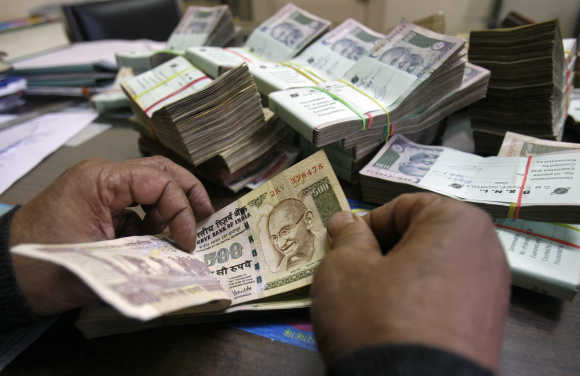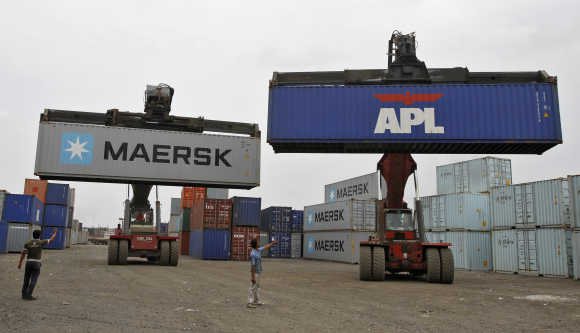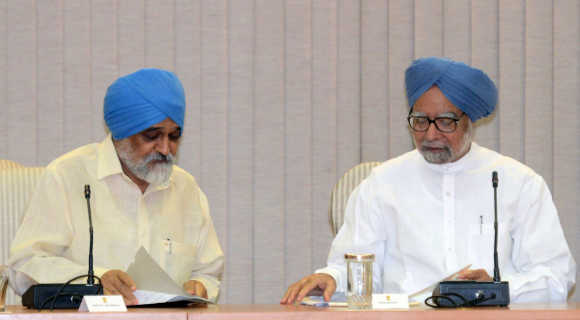Photographs: Vivek Prakash/Reuters
The Reserve Bank of India, in its mid-quarter review of monetary policy on Monday, cut the cash reserve ratio by 25 basis points to 4.5 per cent, while leaving the policy rate unchanged at eight per cent.
The immediate impact of the cut in CRR is likely to be increased pressure on banks to use the extra liquidity to cut lending rates - pressure that will be reinforced, no doubt, by a finance ministry anxious to see quick results.
Given that CRR earns no interest, an additional Rs 17,000 crore (Rs 170 billion) of liquidity in the system will also release some of the pressure on the stressed banking sector's bottomline - if it deploys the released funds for lending.
...
Govt must follow up with deeper reform
Image: RBI action should be seen as the absolute minimum it could do.Photographs: Stringer/Reuters
The RBI's action should be seen as the absolute minimum it could do in order to express support for the apparent increase in activity from the Central government on reform and fiscal consolidation, without compromising the fight against inflation.
Indeed, the RBI's statement says as much. On its future course of action, the central bank says that "as policy actions to stimulate growth materialise, monetary policy will reinforce the positive impact of these actions while maintaining its focus on inflation management.
Only this will ensure that the economy derives the maximum benefit from the recent, and anticipated, fiscal and supply-side policy measures."
...
Govt must follow up with deeper reform
Image: Rise in diesel prices reduces the fiscal gap by only 20 per cent.Photographs: Amit Dave/Reuters
In other words, the RBI expects more from the government than last week's very limited package of reforms and fiscal measures. Indeed, the truth is that the rise in diesel prices announced so far reduces the fiscal gap caused by subsidies by only 20 per cent.
Much more is necessary to ensure that the 2012-13 fiscal deficit does not miss Budget targets by as much as the deficit slippage was for 2011-12.
Clearly, the RBI feels that in the absence of more comprehensive fiscal consolidation, it cannot be expected to loosen monetary policy as much as New Delhi would like; government market borrowing is simply too large for policy transmission to work effectively.
...
Govt must follow up with deeper reform
Image: Capital goods output fell by almost 17 per centPhotographs: Amit Dave/Reuters
If the RBI is not willing to move to cut interest costs for companies to allow them to invest, the government must work harder to remove bottlenecks in investment. It is clear that the immediate cause of the slowdown is a collapse of the investment cycle.
In the April-July period, capital goods output fell by almost 17 per cent. This has severe implications for the future of growth, and the investment pipeline.
Clearly, Friday's reform package needs to be followed up by structural changes that make investment easier for companies, as well as by an increase in the nimbleness of administrative support to investment.
...
Govt must follow up with deeper reform
Image: Congress support for reform must be made more explicit.Photographs: Raveedran/Pool/Reuters
Fortunately, the political benefits of changing the subject to growth-enhancing reform should now be obvious to the UPA leadership.
It is obvious that the recent reform package could not have happened if the Congress party's leadership was not finally willing to risk the government's stability, at the point when the government's reputation was most under attack.
The party's support for reform must be made more explicit, and extend to supporting further and deeper reform in the weeks to come.







article